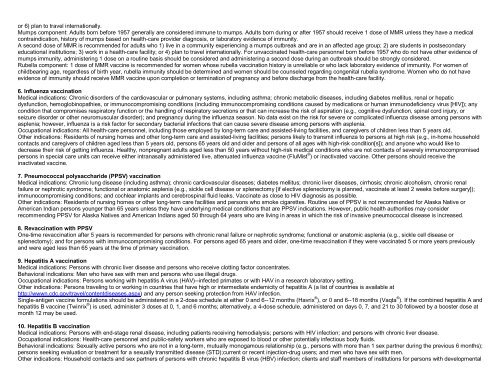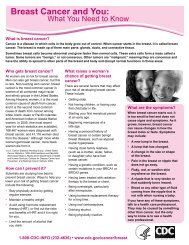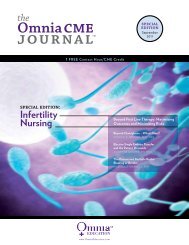2009 Recommended Adult Immunization Schedule - Omnia Education
2009 Recommended Adult Immunization Schedule - Omnia Education
2009 Recommended Adult Immunization Schedule - Omnia Education
You also want an ePaper? Increase the reach of your titles
YUMPU automatically turns print PDFs into web optimized ePapers that Google loves.
or 6) plan to travel internationally.<br />
Mumps component: <strong>Adult</strong>s born before 1957 generally are considered immune to mumps. <strong>Adult</strong>s born during or after 1957 should receive 1 dose of MMR unless they have a medical<br />
contraindication, history of mumps based on health-care provider diagnosis, or laboratory evidence of immunity.<br />
A second dose of MMR is recommended for adults who 1) live in a community experiencing a mumps outbreak and are in an affected age group; 2) are students in postsecondary<br />
educational institutions; 3) work in a health-care facility; or 4) plan to travel internationally. For unvaccinated health-care personnel born before 1957 who do not have other evidence of<br />
mumps immunity, administering 1 dose on a routine basis should be considered and administering a second dose during an outbreak should be strongly considered.<br />
Rubella component: 1 dose of MMR vaccine is recommended for women whose rubella vaccination history is unreliable or who lack laboratory evidence of immunity. For women of<br />
childbearing age, regardless of birth year, rubella immunity should be determined and women should be counseled regarding congenital rubella syndrome. Women who do not have<br />
evidence of immunity should receive MMR vaccine upon completion or termination of pregnancy and before discharge from the health-care facility.<br />
6. Influenza vaccination<br />
Medical indications: Chronic disorders of the cardiovascular or pulmonary systems, including asthma; chronic metabolic diseases, including diabetes mellitus, renal or hepatic<br />
dysfunction, hemoglobinopathies, or immunocompromising conditions (including immunocompromising conditions caused by medications or human immunodeficiency virus [HIV]); any<br />
condition that compromises respiratory function or the handling of respiratory secretions or that can increase the risk of aspiration (e.g., cognitive dysfunction, spinal cord injury, or<br />
seizure disorder or other neuromuscular disorder); and pregnancy during the influenza season. No data exist on the risk for severe or complicated influenza disease among persons with<br />
asplenia; however, influenza is a risk factor for secondary bacterial infections that can cause severe disease among persons with asplenia.<br />
Occupational indications: All health-care personnel, including those employed by long-term care and assisted-living facilities, and caregivers of children less than 5 years old.<br />
Other indications: Residents of nursing homes and other long-term care and assisted-living facilities; persons likely to transmit influenza to persons at high risk (e.g., in-home household<br />
contacts and caregivers of children aged less than 5 years old, persons 65 years old and older and persons of all ages with high-risk condition[s]); and anyone who would like to<br />
decrease their risk of getting influenza. Healthy, nonpregnant adults aged less than 50 years without high-risk medical conditions who are not contacts of severely immunocompromised<br />
persons in special care units can receive either intranasally administered live, attenuated influenza vaccine (FluMist ® ) or inactivated vaccine. Other persons should receive the<br />
inactivated vaccine.<br />
7. Pneumococcal polysaccharide (PPSV) vaccination<br />
Medical indications: Chronic lung disease (including asthma); chronic cardiovascular diseases; diabetes mellitus; chronic liver diseases, cirrhosis; chronic alcoholism, chronic renal<br />
failure or nephrotic syndrome; functional or anatomic asplenia (e.g., sickle cell disease or splenectomy [if elective splenectomy is planned, vaccinate at least 2 weeks before surgery]);<br />
immunocompromising conditions; and cochlear implants and cerebrospinal fluid leaks. Vaccinate as close to HIV diagnosis as possible.<br />
Other indications: Residents of nursing homes or other long-term care facilities and persons who smoke cigarettes. Routine use of PPSV is not recommended for Alaska Native or<br />
American Indian persons younger than 65 years unless they have underlying medical conditions that are PPSV indications. However, public health authorities may consider<br />
recommending PPSV for Alaska Natives and American Indians aged 50 through 64 years who are living in areas in which the risk of invasive pneumococcal disease is increased.<br />
8. Revaccination with PPSV<br />
One-time revaccination after 5 years is recommended for persons with chronic renal failure or nephrotic syndrome; functional or anatomic asplenia (e.g., sickle cell disease or<br />
splenectomy); and for persons with immunocompromising conditions. For persons aged 65 years and older, one-time revaccination if they were vaccinated 5 or more years previously<br />
and were aged less than 65 years at the time of primary vaccination.<br />
9. Hepatitis A vaccination<br />
Medical indications: Persons with chronic liver disease and persons who receive clotting factor concentrates.<br />
Behavioral indications: Men who have sex with men and persons who use illegal drugs.<br />
Occupational indications: Persons working with hepatitis A virus (HAV)--infected primates or with HAV in a research laboratory setting.<br />
Other indications: Persons traveling to or working in countries that have high or intermediate endemicity of hepatitis A (a list of countries is available at<br />
http://wwwn.cdc.gov/travel/contentdiseases.aspx) and any person seeking protection from HAV infection.<br />
Single-antigen vaccine formulations should be administered in a 2-dose schedule at either 0 and 6--12 months (Havrix ® ), or 0 and 6--18 months (Vaqta ® ). If the combined hepatitis A and<br />
hepatitis B vaccine (Twinrix ® ) is used, administer 3 doses at 0, 1, and 6 months; alternatively, a 4-dose schedule, administered on days 0, 7, and 21 to 30 followed by a booster dose at<br />
month 12 may be used.<br />
10. Hepatitis B vaccination<br />
Medical indications: Persons with end-stage renal disease, including patients receiving hemodialysis; persons with HIV infection; and persons with chronic liver disease.<br />
Occupational indications: Health-care personnel and public-safety workers who are exposed to blood or other potentially infectious body fluids.<br />
Behavioral indications: Sexually active persons who are not in a long-term, mutually monogamous relationship (e.g., persons with more than 1 sex partner during the previous 6 months);<br />
persons seeking evaluation or treatment for a sexually transmitted disease (STD);current or recent injection-drug users; and men who have sex with men.<br />
Other indications: Household contacts and sex partners of persons with chronic hepatitis B virus (HBV) infection; clients and staff members of institutions for persons with developmental





